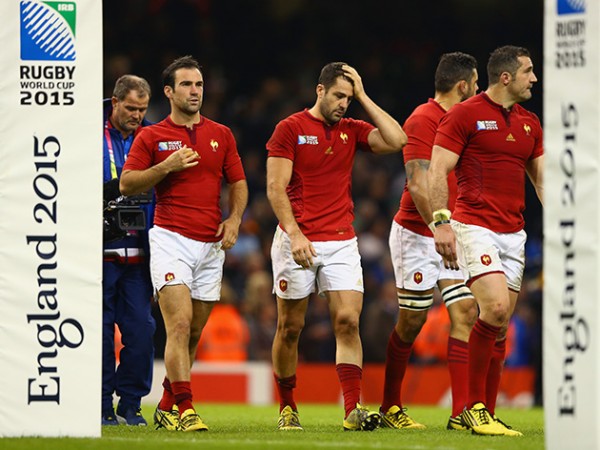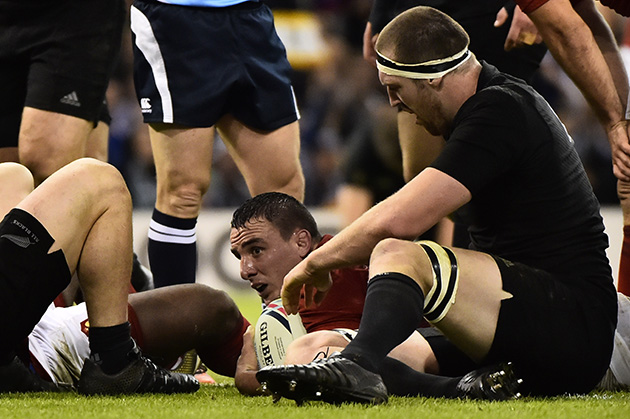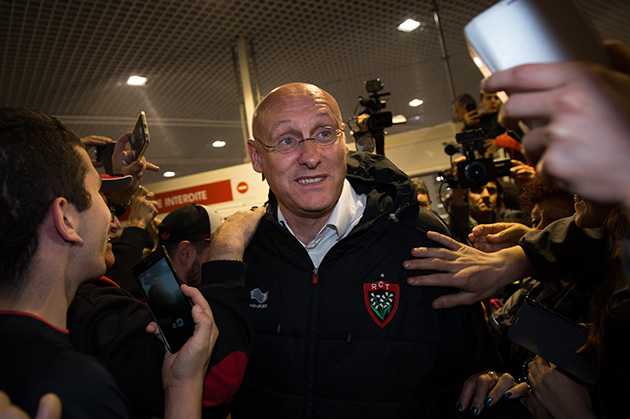Bernard Laporte is set to bid for FFR presidency after France's disastrous World Cup campaign
And to think English rugby has a few rocky weeks in store as the RFU’s World Cup review panel sifts through the rubble of their disastrous campaign. It will be mild compared to what’s brewing across the Channel because the next 12 months promise to be the stormiest in France’s history.
A battle for the soul of French rugby is underway between the old conservative guard, led by Pierre Camou, the 70-year-old president of the Fédération Française de Rugby (FFR), and the revolutionary guard, headed by Toulon director of rugby Bernard Laporte, 20 years his junior.
Camou has been in the post since 2008, a period which has witnessed unprecedented failure for the national team, culminating in Saturday’s record defeat by New Zealand. France have been playing Tests for 109 years but never in 723 matches have they conceded as many as 62 points.
Yet Camou appears to believe these failings have nothing to do with his presidency. Indeed, the noises coming from the FFR suggest he will stand for a third term in December 2016, despite an earlier understanding he would not.
It was Camou and his cronies who earlier this year appointed the 61-year-old Guy Noves as the next France coach, a poor choice given his age, his reputation as a difficult character and the fact he’s overseen a dramatic slump in Toulouse’s fortunes during several years.
It’s been alleged that the selection process for the new coach was a sham, and that far from studying the candidatures of several prominent applicants – including Fabien Galthie and Raphael Ibanez – it was always the intention of the FFR to appoint Noves; in effect, in recognition of services rendered to Toulouse.
Now it emerges that Noves might not be in his position for long. According to an astonishing disclosure in Monday’s Midi Olympique, if Laporte wins the presidency he “will very rapidly terminate Guy Noves’s mandate at the head of the French XV, certainly without waiting until the end of the 2017 Six Nations”.
That incendiary information was provided to Midi Olympique “off the record” but it’s entirely credible. Laporte and Noves are not the best of friends. When the former Toulouse coach was named as Philippe Saint-Andre’s successor, Laporte recalled the lack of cooperation he’d received from Noves while coach of France. “He often barred the path of selectors and we couldn’t go to Toulouse to watch training sessions,” said Laporte. “One shouldn’t forget that.”
But will Laporte triumph in next year’s election? His stock has certainly risen given the calamity of France’s World Cup campaign. It’s difficult to convey the depths of the despondency in France right now. Just about everyone involved in the sport recognises that a fundamental change is required in the way rugby is coached, structured and managed if France isn’t to slip irredeemably into the second tier of world rugby.
And Laporte represents the face of that change. “My first objective is to restore the democracy in our sport,” he declared in August, when officially declaring his candidature for the presidency. “I am for new ideas carried by new people.” He is also for greater accountability and transparency within the FFR, an organisation that he has likened in the past to a “dictatorship”.
Laporte is also desperate to decentralise the powers invested in the FFR, and that includes the election procedure for the presidency. At the moment it is all weighted in favour of the incumbent. Individual clubs don’t vote, instead it’s the rugby chiefs of the Department (similar to English counties), who cast the final vote. Many of these chiefs are on very good terms with Camou, as seen by his winning 89% of the vote when elected for a second term in 2012.
Aware of this network of old-boy self-interest, Laporte advised Camou in August he should not seek a third term next year because it would convey the impression he and his cronies “don’t want to leave their posts”. A week after Laporte’s comments, a story broke in the French press linking Toulon to a doping scandal. The club president, Mourad Boudjellal, furiously rejected the allegations, telling reporters: “There are people who might have an interest in sullying us.”
It wasn’t hard to work out who he meant.
Camou looks determined to cling to power, while simultaneously distancing himself from the failings of the national team. A French rugby journalist told me that the FFR president was invited into the television studio on Sunday; as the head of the sport surely he would want to explain to the nation’s rugby followers (12m of whom tuned in for the quarter-final) what has gone wrong and how it can be fixed. “He refused,” explained the journalist. “He is running away from his responsibilities and in doing so he is ruining French rugby.”
Laporte versus Camou. The winner of the power struggle will be either the saviour of French rugby, or its slayer.
For the latest Rugby World subscription offers, click here.









